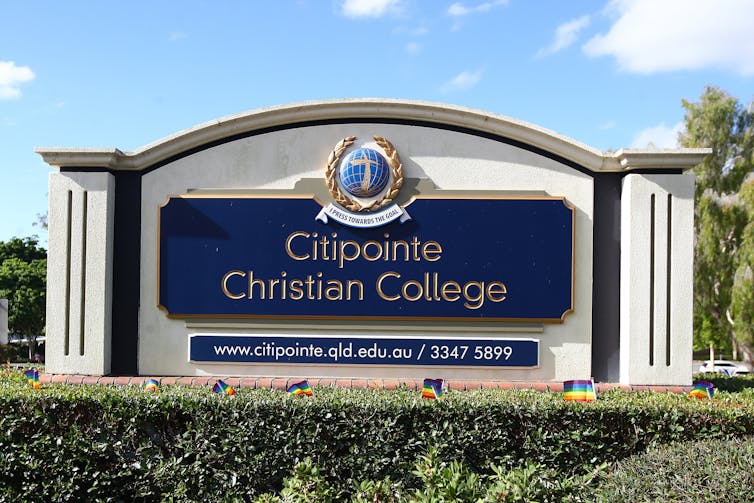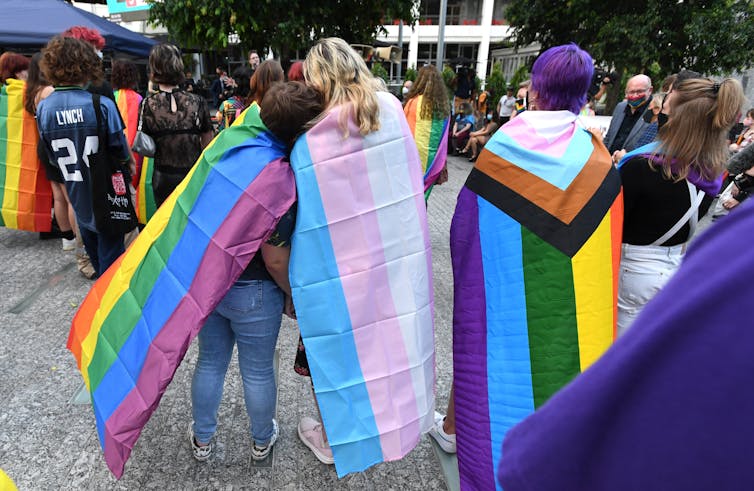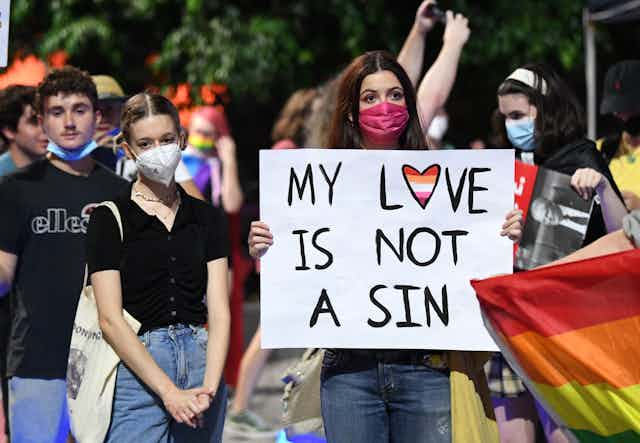As the government prepares to push through its controversial religious discrimination bill this week, serious questions have been raised about protections for gay and transgender students in faith-based schools.
It comes after Citipointe Christian College in Brisbane faced criticism for sending enrolment contracts to parents with gender and sexuality clauses comparing homosexuality to bestiality and paedophilia. The contract was revoked and the principal has stood aside.
Another private Sydney school also came under fire for a “statement of faith” with its enrolment applications that listed same-sex relationships and transgender identity as being “not acceptable to God”.
These schools are not attempting anything new. The practice of excluding LGBTQIA+ people from religious spaces has a long, winding history.
As a gay man and pastor who previously held a conservative view, I wanted to undertake research to understand the experiences of people who have navigated this complex terrain. I interviewed 24 LGBTQIA+ people who had all spent time in a range of conservative Christian denominations, many of whom had grown up attending religious schools.
You could be forgiven for thinking LGBTQIA+ communities and the church are (as one of my participants said) “like oil and water” - never the two shall mix. But as many as 32% of same-sex couples in Australia identify as Christian, and increasingly, LGBTQIA+ Christians are having their voices heard.
The stories from the participants in my research are, almost across the board, vivid depictions of religious trauma.
Read more: Only 19% of Australians agree religious schools should be able to ban LGBT+ teachers
Understanding religious trauma
Religious trauma has been defined as “pervasive psychological damage resulting from religious messages, beliefs and experiences”.
Picture the teenage student at a faith-based school who has experienced a dawning realisation they are not neatly heterosexual. In this kind of environment, the student might be told on a regular basis their sexuality is broken and it is a source of shame or the work of Satan. They are warned against ever experiencing intimacy because doing so would be an indication they are not saved and are destined for Hell.

According to my participants, words to this effect are spoken gently by chaplains in the corridors, loudly by peers on the playground and formally by executive staff in the office. Gay people are compared with murderers. Trans people are depicted as threats to the order of society.
Parents absorb these messages and reinforce them, either explicitly or by their resounding silence.
In my research, one participant recounted a talk she heard at a church youth group as a teenager, just as she was just coming to terms with her sexuality.
It was a talk just about relationships […] and point seven of 15 was ‘being gay is not real’. It was such a confronting thing to hear when I was just at the pinnacle of realising what was happening for me, here was someone saying it doesn’t even exist. ‘It’s a disease that can be healed.’
Another young man talked about the trauma of his teenage years when he was forced to attend counselling.
That was probably the lowest point that it ever got, because it was just a constant barrage of being told that I am horrible, that I am never going to amount to anything in life. And because of this small difference, I will never be considered human, never be considered like everybody else, never be loved, never be accepted, never have a wife.
I asked another young woman what she would like Christian leaders to understand. She replied:
They are not being driven to the edge of suicide because of what they believe, but I am, because of how they have treated me.
My research found LGBTQIA+ people may encounter dozens, or even hundreds of these moments, in any given week or month in their daily lives. These are moments when the individual recognises they are not in a safe environment.
Over time, large and small moments like this (often referred to as microaggressions) accumulate and a person’s mental health almost inevitably deteriorates. Research shows young queer people exposed to religiously motivated messages are alarmingly more likely to express thoughts of self-harm and suicidal ideation.

What queer Christians need to feel safe
By virtue of being part of a marginalised community, queer Christians don’t necessarily have the benefit of social supports and protective factors available to the broader population.
The very people who should be providing safety and protection (their parents, teachers and pastors) are, in many cases, actually inflicting the harm. Behavioural scientists recognise this experience as a form of minority stress. As one participant shared,
When you’re in a Christian school, the last thing that you expect is full-on bullying from your own Christian teachers and leaders. They are the ones that you want to reach out to for help, but they were the last people that I wanted to go to and the last people that I felt safe around.
All of this is built on an interpretation of the Bible that asserts God designed all humans to be straight and cisgender - anything else is a form of “brokenness”.
It is important to note, however, some of the most critical voices against Citipointe have been other Christians (many of them connected with the school).
This is testament to a large (and growing) portion of the church which has sought to understand the Bible in light of scientific research into the nature of gender and sexuality.
Legislative solutions are only one remedy to the complexities of LGBTQIA+ exclusion. As a society, we must continue to seek to understand these issues without falling into the “Christians versus queer community” trap.
And while identifying these experiences as trauma is vital, the path to healing can only come when queer people feel safe to connect in faith communities without threat of exclusion. Religious leaders must now grapple with how to navigate this path. Change is happening, but the path to inclusion is far from complete.
If you or anyone you know has self-harmed or thought about it, contact Lifeline on 13 11 14 or Kids Helpline on 1800 55 1800.


